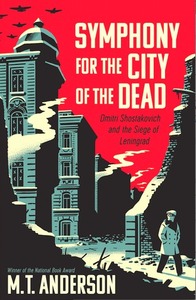Take a photo of a barcode or cover
370 reviews for:
Symphony for the City of the Dead: Dmitri Shostakovich and the Siege of Leningrad
M.T. Anderson
370 reviews for:
Symphony for the City of the Dead: Dmitri Shostakovich and the Siege of Leningrad
M.T. Anderson
Anderson worked hard to compile a story of DS that draws from many sources. Deeply appreciative of his efforts, which have helped me fill big gaps in my understanding of Russian literature and art, as well as WWII.
dark
inspiring
sad
medium-paced
"So many years have passed since that day and memory is a funny thing, like drying paint. It changes color as it dries. But that symphony has stayed with me the way it was that night. Afterwords, it was still a city under siege, but I knew it would live. Music is life, after all. What is life without music? This was the music that proved our city had come back to life after death."
This is a detailed retelling of the life of Russians and notably Dmitry Shostakovich, who wrote his famous Symphony No. 7 to glorify the city's resistance and defiance to fascism. (Give it a listen.)
I remember being profoundly moved during a visit to the Monument to the Heroic Defenders of Leningrad and the horrors the Leningraders endured under Stalin and WWII. You move from the monument above ground to an underground space, dark and somber, walls lined with photos recounting the tragedy.
"Roughly six million people starved to death during the implementation of the Five-Year Plan. In 1933, more than four million people starved in Ukraine alone as their food was taken from them to pay for foreign factory equipment. The Soviet president of Ukraine admitted, 'We know millions are dying. That is unfortunate but the glorious future of the Soviet Union will justify it.'"
This is a detailed retelling of the life of Russians and notably Dmitry Shostakovich, who wrote his famous Symphony No. 7 to glorify the city's resistance and defiance to fascism. (Give it a listen.)
I remember being profoundly moved during a visit to the Monument to the Heroic Defenders of Leningrad and the horrors the Leningraders endured under Stalin and WWII. You move from the monument above ground to an underground space, dark and somber, walls lined with photos recounting the tragedy.
"Roughly six million people starved to death during the implementation of the Five-Year Plan. In 1933, more than four million people starved in Ukraine alone as their food was taken from them to pay for foreign factory equipment. The Soviet president of Ukraine admitted, 'We know millions are dying. That is unfortunate but the glorious future of the Soviet Union will justify it.'"
Although written for a teen audience, this narrative nonfiction could and should be read by anyone. Through the lens of Dmitri Shostakovich's life the reader is shown the grim history of Leningrad (and Russia) under Stalin's regime. But in the darkest moments, when humanity seems to have consumed itself, we are given hope that--through music, literature, and the arts--people will once again triumph over oppression. Eyeopening and shocking, but very much a worthwhile read.
Holy god above. This book was a TRIP. I’ve been interested in Shostakovich since I was roughly ten (ish?) when I was introduced to his jazz suite by my violin teacher at the time. Coincidentally, Shostakovich is my father’s favorite composer, and I’ve been listening to his music for quite a while before my first real introduction to the music. Enough rambling though.
I would consider myself quite a stickler for Russian history. Whether it be Peter the Great or Gorbachev, I’ll probably read it. So, with that being said, I went into this book already knowing a good deal about both the Siege of Leningrad and Dmitri Shostakovich. However, I knew little about the Leningrad Symphony as a whole. I’ve listened to it a few times, but it was background music.
When I compare it to previous books I’ve read, specifically pertaining to Soviet Russia, they’ve been pretty biased. This, however, was not. It is a book about a horrific event, yet it manages to provide unflinching insight in such a way that it doesn’t come across as biased. Furthermore, it almost reads like a thriller, although that is my humble interpretation.
“History is not simply the great tumults and tragedies but the accumulation of tiny moments and gestures.” That’s found in the last paragraph.
I would consider myself quite a stickler for Russian history. Whether it be Peter the Great or Gorbachev, I’ll probably read it. So, with that being said, I went into this book already knowing a good deal about both the Siege of Leningrad and Dmitri Shostakovich. However, I knew little about the Leningrad Symphony as a whole. I’ve listened to it a few times, but it was background music.
When I compare it to previous books I’ve read, specifically pertaining to Soviet Russia, they’ve been pretty biased. This, however, was not. It is a book about a horrific event, yet it manages to provide unflinching insight in such a way that it doesn’t come across as biased. Furthermore, it almost reads like a thriller, although that is my humble interpretation.
“History is not simply the great tumults and tragedies but the accumulation of tiny moments and gestures.” That’s found in the last paragraph.
challenging
informative
reflective
slow-paced
Fascinating story about the life and trials of this Russian composer. Great pictures from the times, giving visuals to the descriptions. I listened to the symphonies described to get an even richer experience to the descriptions.
So much suffering by the citizens of Leningrad, it was eye opening to read the history.
So much suffering by the citizens of Leningrad, it was eye opening to read the history.
challenging
dark
hopeful
inspiring
reflective
medium-paced
challenging
dark
emotional
informative
sad
medium-paced
challenging
dark
emotional
informative
reflective
sad
tense
medium-paced




